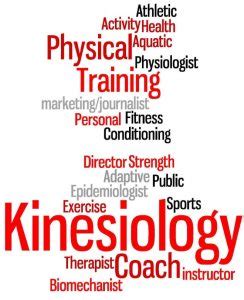Careers In Kinesiology

Kinesiology, the scientific study of human movement, is a fascinating field that offers a wide range of career opportunities. From helping individuals enhance their physical performance to playing a crucial role in healthcare and rehabilitation, kinesiology professionals make a meaningful impact on people's lives. If you're passionate about health, fitness, and the human body, a career in kinesiology might be the perfect fit for you.
The Scope of Kinesiology Careers

Kinesiology, a multidisciplinary field, provides a diverse range of career paths, each offering unique challenges and opportunities for growth. Here’s an overview of some of the most popular and rewarding careers in kinesiology:
1. Exercise Physiologist
Exercise physiologists are experts in understanding the physiological responses and adaptations to exercise. They work with a variety of clients, from athletes aiming to optimize their performance to individuals with chronic conditions seeking improved health. These professionals design and implement exercise programs tailored to each client’s needs, considering factors like age, fitness level, and health status.
In their role, exercise physiologists also educate clients about the benefits of exercise, helping them adopt healthier lifestyles. They often collaborate with other healthcare professionals, such as physicians and nutritionists, to develop comprehensive treatment plans. Additionally, exercise physiologists may conduct research to advance the field of kinesiology and improve exercise recommendations for specific populations.
Key responsibilities of an exercise physiologist include:
- Conducting fitness assessments and interpreting results
- Designing personalized exercise programs
- Monitoring and evaluating client progress
- Providing education on exercise and health promotion
- Collaborating with healthcare teams for holistic care
2. Sports Therapist
Sports therapists are integral to the world of sports and athletics, providing care and support to athletes of all levels. They work closely with athletes to prevent, diagnose, and treat injuries, helping them maintain optimal physical performance and overall well-being.
Sports therapists utilize a range of therapeutic techniques, including manual therapy, exercise prescription, and sports massage. They also play a vital role in rehabilitation, developing customized plans to help athletes recover from injuries and return to their sport safely and effectively.
The key responsibilities of a sports therapist encompass:
- Conducting pre-participation screenings to assess athletes’ readiness
- Providing injury prevention strategies and advice
- Treating acute and chronic injuries using various therapeutic methods
- Developing and overseeing rehabilitation programs
- Educating athletes and coaches on injury management and performance enhancement
3. Kinesiotherapist
Kinesiotherapists specialize in using movement as a therapeutic tool for rehabilitation. They work with individuals who have experienced physical trauma, surgery, or chronic conditions, helping them regain mobility, strength, and independence.
Through customized exercise programs and therapeutic techniques, kinesiotherapists guide their patients toward improved physical function and overall quality of life. They often collaborate with physicians, physical therapists, and other healthcare professionals to ensure comprehensive care.
The primary responsibilities of a kinesiotherapist include:
- Conducting comprehensive assessments to determine patients’ functional abilities
- Designing and implementing personalized exercise plans
- Monitoring and evaluating patient progress
- Providing education on injury prevention and self-management strategies
- Collaborating with interdisciplinary healthcare teams
4. Ergonomist
Ergonomists focus on optimizing the interaction between humans and their work environments to ensure comfort, safety, and productivity. They apply principles of kinesiology to design workspaces, tools, and systems that minimize physical strain and maximize efficiency.
In their role, ergonomists conduct workplace assessments, identify ergonomic risks, and implement solutions to improve the overall well-being of workers. They work across various industries, including manufacturing, healthcare, and office settings, to create ergonomic solutions tailored to specific job demands.
Key responsibilities of an ergonomist include:
- Conducting ergonomic assessments of workplaces and job tasks
- Identifying ergonomic risk factors and designing interventions
- Providing ergonomic training and education to employees
- Collaborating with employers to implement ergonomic solutions
- Conducting research to advance the field of ergonomics
5. Clinical Exercise Specialist
Clinical exercise specialists work in clinical settings, such as hospitals and rehabilitation centers, to help patients manage chronic conditions and improve their overall health. They collaborate closely with medical teams to develop exercise programs tailored to each patient’s unique needs and medical conditions.
These specialists play a crucial role in helping patients regain functional abilities and manage symptoms associated with conditions like cardiovascular disease, diabetes, and neurological disorders. They also provide education on lifestyle modifications and self-management strategies.
The core responsibilities of a clinical exercise specialist encompass:
- Conducting thorough patient assessments to understand their medical history and functional abilities
- Designing and implementing safe and effective exercise programs
- Monitoring and evaluating patient progress and outcomes
- Providing education on exercise adherence and healthy lifestyle choices
- Collaborating with healthcare professionals to ensure integrated care
Education and Training Requirements

The educational path for kinesiology careers varies depending on the specific role and desired level of specialization. Generally, a bachelor’s degree in kinesiology or a related field, such as exercise science or athletic training, is the minimum requirement for entry-level positions.
For more advanced roles and specializations, such as becoming an exercise physiologist or sports therapist, a master’s degree in kinesiology or a related field is often preferred. These graduate programs provide deeper knowledge and practical skills, allowing graduates to pursue specialized certifications and advanced career opportunities.
Additionally, many kinesiology careers require professional certifications and licenses. For example, to become a Certified Exercise Physiologist (EP-C), individuals must meet eligibility requirements and pass a comprehensive exam administered by the American College of Sports Medicine (ACSM). Similarly, sports therapists often pursue certifications through organizations like the National Academy of Sports Medicine (NASM) or the National Strength and Conditioning Association (NSCA).
Salary and Career Outlook
The earning potential in kinesiology careers can vary significantly depending on factors such as education, specialization, experience, and geographic location. Here’s a snapshot of the average salaries for some of the careers discussed:
| Career | Average Salary (USD) |
|---|---|
| Exercise Physiologist | $55,000 - $85,000 |
| Sports Therapist | $40,000 - $65,000 |
| Kinesiotherapist | $50,000 - $75,000 |
| Ergonomist | $60,000 - $90,000 |
| Clinical Exercise Specialist | $45,000 - $70,000 |

The kinesiology field is expected to experience steady growth in the coming years, driven by the increasing focus on health and wellness, an aging population, and the rising prevalence of chronic conditions. As the demand for healthcare services grows, so does the need for kinesiology professionals who can provide specialized care and improve patient outcomes.
FAQs
What is the primary role of a kinesiologist in healthcare settings?
+Kinesiologists play a crucial role in healthcare by using movement and exercise as therapeutic tools to improve patients’ physical function and overall well-being. They work closely with medical teams to develop personalized exercise programs, help patients manage chronic conditions, and support their recovery from injuries or surgeries.
What are the key skills needed for a career in kinesiology?
+Key skills for kinesiology careers include a strong understanding of human anatomy and physiology, knowledge of exercise science and prescription, excellent communication and interpersonal skills, the ability to design and implement effective exercise programs, and a passion for helping others achieve their health and fitness goals.
How can I pursue a career as an exercise physiologist?
+To become an exercise physiologist, you typically need a bachelor’s or master’s degree in kinesiology, exercise science, or a related field. Additionally, you may need to obtain professional certifications, such as the ACSM’s EP-C certification, which requires meeting eligibility criteria and passing an exam.
What are the benefits of pursuing a career in sports therapy?
+Sports therapy offers the opportunity to work closely with athletes and sports teams, providing specialized care to prevent and treat injuries. Sports therapists play a vital role in helping athletes optimize their performance, recover from injuries, and maintain overall well-being. It’s a rewarding career for those passionate about sports and helping others achieve their athletic goals.
Are there opportunities for specialization within kinesiology careers?
+Yes, kinesiology careers offer a wide range of specialization options. For example, you can specialize in sports performance, rehabilitation, pediatric kinesiology, geriatric kinesiology, or workplace ergonomics. Specialization allows you to focus on specific populations or areas of interest, deepening your expertise and career opportunities.



